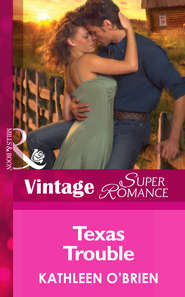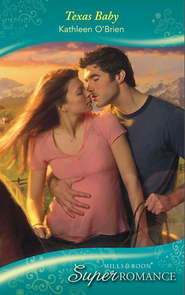По всем вопросам обращайтесь на: info@litportal.ru
(©) 2003-2025.
✖
Happily Never After
Автор
Год написания книги
2019
Настройки чтения
Размер шрифта
Высота строк
Поля
This afternoon she’d picked out half a dozen sheets of the most beautiful green full-antique glass. It had cost a fortune, virtually eliminating any hope that this project would turn a profit. But the glass had such extraordinary linear striations, which would produce grape leaves so textured and real no customer would walk through that entryway without reaching out to touch them.
She hadn’t been able to resist. Anyhow, if this project turned out to look as spectacular as she hoped, it would be worth its weight in permanent advertising.
She adjusted a couple of boxes so that everything was wedged in snugly, and then, hearing an odd noise behind her, she turned.
Trig Boccardi was standing only about four feet behind the truck, a glower on his heavy face, erasing what little good looks he had left from his high-school glory.
Unnerved, Kelly glanced around. Mary Jo’s café was the last store at the dead end. Unless he had climbed over the alley fence, or come out of the café kitchen, he had pretty much materialized out of thin air.
“Hi, Trig,” she said neutrally. She whisked shut the van’s cargo doors. She didn’t like to have those pricy sheets of glass exposed to anyone as unpredictable as Trig. “Where’d you come from? You startled me.”
“You took it.” Trig’s brows hung low over his eyes. “Didn’t you?”
She didn’t like his tone, which was strangely aggressive. And, as usual, he wasn’t making sense. “I don’t know what you mean. Took what?”
“The lace. You took the lace from the wreath. Don’t pretend you didn’t. I saw you do it.”
Kelly’s stomach tightened. He had seen her? He had been watching her? From where? No wonder she’d had such a creepy feeling about spending the night alone.
How often did he do that?
“Yes,” she said. “I took it.”
“You shouldn’t have. It’s not yours.”
She glanced toward the front of the alley. The refrigeration truck was still there. But that wasn’t all bad. It meant that somewhere nearby was a truck driver, too. Just in case.
And Mary Jo was just inside the café. She’d come out if she had any idea something was wrong. Kelly began to move around the van a little, toward the driver’s side. Toward the horn.
“You shouldn’t have taken it,” he repeated. He had followed her all the way around, still staring intently.
“Why not?” She paused by the door, wishing she’d left the window open so she could just reach in and touch the horn. She tried to read his expression, unsure whether he was very sad, or very angry—or maybe even a little frightened himself. “Did you put the lace there, Trig?”
He recoiled. “Of course not. She put it there.”
“She? Who?”
He blinked several times, always a sign that he was agitated. “You know who. It’s hers.” He advanced a step. “She’ll be mad that you took it.”
Behind her back, she began to rearrange her keys in the palm of her hand, so that the metal points stuck out between her fingers. Trig was big and muscular, but his thinking was slow, and she hoped his reflexes were, too.
“Maybe you’re right,” she said. “Maybe I shouldn’t have. I was just surprised when I saw it, and I wasn’t thinking. Maybe I should put it back.”
He thrust out his hand. “I’ll put it back. You shouldn’t have taken it.”
Did he think she carried it with her everywhere she went? “I don’t have it with me,” she said. “Don’t worry about it, Trig. I’ll take care of it later.”
“No,” he said. He took another step, his head ducked low, like an animal who was considering an attack. She’d never appreciated how much like a bull he actually looked, with that bulky body and that triangular head.
The groan and grind of gears just ahead told her the truck was leaving. Taking advantage of the distraction, she pulled open the door and climbed quickly into the driver’s seat. Shutting herself in, she rolled down the window and looked sternly at Trig.
“I want you to go home now, Trig. And I want you to leave me alone.”
He put his hand on the door. “No,” he said harshly.
“Yes,” she said, putting her keys in the ignition and turning over the engine, which, thankfully, started right up. Suddenly the two thousand dollars she’d paid the dealership seemed like a bargain.
“You have to go home now. And listen to me, Trig. I don’t know why you were watching me the other night, but I want you to stop it. You can get in a lot of trouble for things like that.”
He frowned, backing away a couple of inches, as if her stern tone startled him. He shook his head, a jerky and uncoordinated denial.
“I wasn’t watching you,” he said thinly. He blinked several times. “I was watching her.”
CHAPTER SIX
THE NEXT MORNING Kelly sat at her studio’s semicircular work desk, heart-shaped pieces of glimmering green glass littering the countertops. It looked as if, sometime during the night, the ceiling had rained enchanted leaves.
But she wasn’t paying any attention to the freshly cut pieces, which were ready to be burnished with foil. Instead, she was listening to the ringing telephone crooked between her ear and her shoulder, and staring at a photograph she held awkwardly in her newly bandaged fingers.
She hardly noticed the bandages. She always sliced or burned herself while she was cutting and grinding small pieces. If nothing required stitches, she considered it a good day’s work.
Besides, the picture held all her attention. She hadn’t looked at it in years. It had been tucked carefully away in the pages of an old scrapbook. It was a picture of Sophie’s wedding party, taken the night of the rehearsal dinner.
No wonder she’d been reluctant to keep it where she could see it. It was as potent as an uncorked vial of magic smoke. Kelly found that she could remember every moment of that night, as if it had been yesterday.
Such vivid memories… The scratchy seams of her green dress, which had been a little too tight. The way they’d all laughed because the cello player was out of tune. The time Lillith had sprayed champagne through her nose when Kent Snyder told a vulgar joke.
She remembered it all, every emotion, right down to the deep, scraping ache in the hollow of her heart.
While the others had been laughing and drinking and playing silly games, Kelly had been counting the hours until Tom officially belonged to Sophie. Twenty-four, twenty-three, twenty-two…
By the time the wedding party corralled a waiter and asked him to take this picture with Kelly’s disposable camera, it was one in the morning. Only seventeen hours until the wedding.
Looking down at those faces now, with all the bitter knowledge of hindsight, Kelly thought maybe she could detect the turmoil seething under the surface smiles.
Against her ear, the phone was still ringing. She hung up and dialed a second time, in case she’d made a mistake. As it began to ring again, she tilted the picture, to better catch the light.
Nine young people. It should have been ten, but Samantha, the maid of honor, had been only seventeen, too young to drink and dance and giggle the night away with the others. She’d been sent home with her parents hours before the picture was taken.
Which left just nine. Sophie and Tom, the bride and the groom. Sebastian, who was the best man. Three ushers— Kent Snyder, Bill Gaskins and Alex VanCamp. Three bridesmaids—Dolly, whose last name was now Tammaro, Lillith, and Kelly herself.
All young. All smiling. But how many of them, Kelly wondered, had been hiding something that night?
Kelly’s own sick guilt was fairly obvious, she thought. Her eyes looked shadowed, and she had her hands clasped in front of her, white-knuckled, almost as if the camera were a harsh deity from which she begged forgiveness.
Sebastian’s head was turned away from the camera, but his jaw was set at a stiff angle, and his shoulders were oddly braced. It was impossible to tell whether he was staring at Sophie or Tom.
Sophie looked gorgeous, of course, in her ice-blue party dress. But her smile was too bright, too fake, as if she were dramatically intoxicated, though Kelly remembered that Sophie had hardly touched her wine that night.











